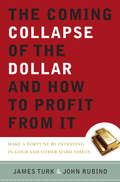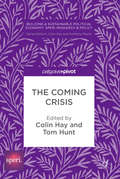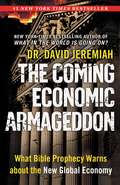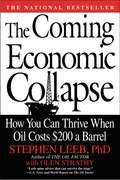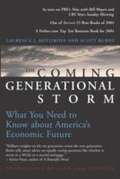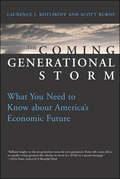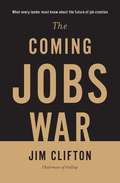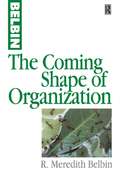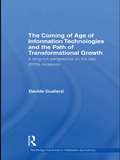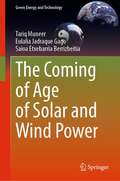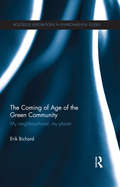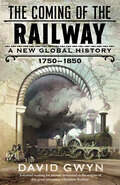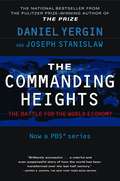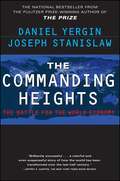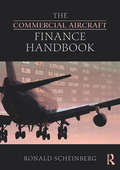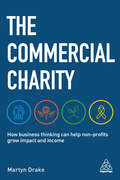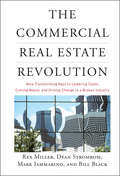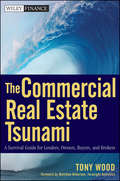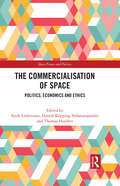- Table View
- List View
The Coming Collapse of the Dollar and How to Profit From It
by James Turk John RubinoPeriodically, the global economy shifts gears in a fundamental way, turning conventional wisdom on its head and producing new categories of winners and losers among investors.
The Coming Crisis
by Tom Hunt Colin HayThis book provides a timely warning of the dangers still present and building in the global economic system, whose frailty was exposed by the global financial crisis, and the Eurozone crisis it spawned. The contributors to this volume draw on SPERI's work on the political economy of growth, stagnation, austerity and crisis, and placing each in the context of the wider environmental crisis.
The Coming Economic Armageddon: What Bible Prophecy Warns About the New Global Economy
by David JeremiahNever before have we read such jarring headlines, distressing news analyses, or dire predictions concerning the world's financial future. The American housing market -- or, more sentimentally, the American dream -- began to collapse in 2006, taking with it large chunks of the global financial system. Millions of jobs worldwide have vanished forever. Did Bible prophecy predict this catastrophe? Are there biblical clues to how soon, if ever, a viable, long-term recovery can be sustained? Is the financial collapse just one of several signs that we are living in the final days of Earth's history In THE COMING ECONOMIC ARMAGEDDON, David Jeremiah says we can know the meaning behind what we see in the daily news -- and understand and prepare for living in the New Global Economy.
The Coming Economic Collapse: How You Can Thrive When Oil Costs $200 a Barrel
by Glen Strathy Stephen LeebGoing far beyond the usual advice to stock up on freeze-dried food and live in a bunker, financial journalist Leeb is convinced our dependence on oil and the dwindling supply is a classic case of impending disaster, in which most will suffer but those who follow his investment advice will become very, very rich. He covers how we tend to think about energy as an everlasting resource, the ways in which government and other institutions are aggravating the problem and what they could do to solve it, the conditions of everyday life in a world of constant energy crisis, the development of China and India as mega-markets that hasten the energy doomsday, and proactive ways to make the most of what he believes will be a desperate situation. Annotation ©2006 Book News, Inc., Portland, OR (booknews.com)
The Coming Economic Implosion of Saudi Arabia: A Behavioural Perspective
by David CowanThe kingdom of Saudi Arabia is at a crossroads economically, and faces the challenge of a weakening economy that could implode before 2030, the year set as a timetable by the kingdom in its Vision 2030. How it navigates its way out of these economic troubles demands understanding a complex of religious, political and economic factors, which currently makes it one of the most unpredictable states in the world and, by the same token, one of the most fascinating. The problem of the Saudi economy cannot simply be argued economically, it needs political and religious solutions as well. Cowan takes a behavioural approach to analysing the Saudi economy. Predicting an implosion under the weight of its own ideologically-fuelled economy if it does not reset its agenda, this interdisciplinary book provides important insights into Saudi Arabia's position in the Islamic world and global economy.
The Coming Generational Storm: What You Need to Know About America's Economic Future
by Laurence J. Kotlikoff Scott BurnsThe Coming Generational Storm has been revised and updated and includes a new foreword by the authors. In 2030, as 77 million baby boomers hobble into old age, walkers will outnumber strollers.
The Coming Generational Storm: What You Need to Know about America's Economic Future
by Laurence J. Kotlikoff Scott BurnsHow to avoid a fiscal crisis in the next generation— and how to protect yourself if the government acts too late: policy recommendations and individual strategies to protect against skyrocketing tax rates, drastically reduced health and retirement benefits, high inflation, and a ruined currency. In 2030, as 77 million baby boomers hobble into old age, walkers will outnumber strollers; there will be twice as many retirees as there are today but only 18 percent more workers. How will America handle this demographic overload? How will Social Security and Medicare function with fewer working taxpayers to support these programs? According to Laurence Kotlikoff and Scott Burns, if our government continues on the course it has set, we'll see skyrocketing tax rates, drastically lower retirement and health benefits, high inflation, a rapidly depreciating dollar, unemployment, and political instability. The government has lost its compass, say Kotlikoff and Burns, and the current administration is heading straight into the coming generational storm.But don't panic. To solve a problem you must first understand it. Kotlikoff and Burns take us on a guided tour of our generational imbalance, first introducing us to the baby boomers—their long retirement years and "the protracted delay in their departure to the next world." Then there's the "fiscal child abuse" that will double the taxes paid by the next generation. There's also the "deficit delusion" of the under-reported national debt. And none of this, they say, will be solved by any of the popularly touted remedies: cutting taxes, technological progress, immigration, foreign investment, or the elimination of wasteful government spending.So how can the United States avoid this demographic/fiscal collision? Kotlikoff and Burns propose bold new policies, including meaningful reforms of Social Security, and Medicare. Their proposals are simple, straightforward, and geared to attract support from both political parties. But just in case politicians won't take the political risk to chart a new direction, Kotlikoff and Burns also offer a "life jacket"—guidelines for individuals to protect their financial health and retirement. This paperback edition of The Coming Generational Storm has been revised and updated and includes a new foreword by the authors.
The Coming Healthcare Revolution: 10 Forces that Will Cure America's Health Crisis
by David W. Johnson Paul KusserowExpert review of how the antiquated United States healthcare system is transforming The Coming Healthcare Revolution: The 10 Forces that Will Cure America's Health Crisis identifies and describes five top-down macro forces and five bottom-up market forces that have sufficient strength to transform the U.S. healthcare industry from the outside-in. The powerful macro forces are demographic determinants, funding fatigue, chronic pandemics, technological imperatives, and pro-consumer/market reforms. The equally powerful market forces are whole health, care redesign, care migration, aggregators' advantage, and empowered caregivers. Written by David Johnson and Paul Kusserow, professional healthcare advisors operating at the intersection of healthcare economics, policy, strategy, and capital formation, this book provides expert insight on how the U.S. healthcare system is becoming cheaper, better, more balanced between prevention and treatment, easier to access, and more empowering for both frontline caregivers and consumers. In this book, readers will learn about: Factors leading to rising healthcare costs, including an aging population, perverse economic incentives, armies of middlemen, and expensive breakthrough therapies U.S. healthcare in comparison to other high-income countries—twice as expensive per-capita, and inferior in terms of health status metrics Similarities between the U.S. automobile industry crisis in the 1980s and today's adapt-or-die situation for healthcare providers and suppliers How the healthcare industry is reorganizing to decentralize delivery of whole-person health in ways that will improve health outcomes and overall societal health The Coming Healthcare Revolution is a must-read for professionals and organizations seeking to understand and react to the paradigm-shifting forces revolutionizing the healthcare ecosystem.
The Coming Jobs War
by Jim CliftonDefinitive leadership strategy for fixing the American economy, drawn from Gallup's unmatched global polling and written by the company's chairman.What everyone in the world wants is a good job. "This is one of the most important discoveries Gallup has ever made," says the company's Chairman, Jim Clifton. In The Coming Jobs War, Clifton makes the bold assertion that job creation and successful entrepreneurship are the world's most pressing issues right now, outpacing runaway government spending, environmental degradation and even the threat of global terrorism. The book is grounded in findings from Gallup's World Poll, which reveals the implications of the jobs war on everything from economics to foreign policy to nothing less than America's moral authority in the world. And it offers a prescription for attacking the jobs issue head-on. Clifton argues that the solution to creating good jobs must be found in cities, not in the federal government. Promoting entrepreneurship and job creation must be the sole mission and purpose of cities' business leaders, government officials and philanthropists. Clifton says that the next big breakthrough will come from the combination of the forces within big cities, great universities and powerful local leaders. Their combined effect is the most reliable, controllable and predictable solution to America's biggest problem. Strong leadership teams and a natural order are already in place within cities -- in governments and local business and philanthropic entities, with caring leaders working on initiatives to fuel local economic growth and to create good jobs. The feat these leaders have to pull off is doubling their entrepreneurial energy by aligning their local forces: local tribal leaders, super mentors and universities. Winning the jobs war will require all hands on deck, and failure is not an option, especially for the United States, which has been the global leader in promoting freedom and entrepreneurship. America's place in the world is at stake, and there are other countries poised to surpass a sputtering U.S. economy that is currently growing at only 2% annually. The biggest threat? China, with a GDP that is increasing at nearly 10% annually -- a pace that will make it the world's leading and most influential economy within the next 30 years. While the statistics are dire, Clifton remains optimistic about America's ability to win the jobs war because America has been here before. "The Greatest Generation saved America by beating the Japanese and Germans at [World War II]. The Baby Boomers saved America a second time by beating the same foes, Japan and Germany, in an economic war that determined the leadership of the free world, again," he says. The Coming Jobs War offers a clear, brutally honest look at America's biggest problem and a cogent prescription for solving it.
The Coming Shape of Organization
by R Meredith BelbinThis book from Meredith Belbin, the UK's leading expert on teams, takes the reader on a different and fascinating journey. His insightful analysis takes us from the faults of typical hierarchies to the new world of restructured, flatter organizations where new sets of problems are emerging. In the search for alternative systems, Belbin outlines ways in which continuous deployment and career development can result in more effective use of people's talents. He describes the world of the higher social insects where evolution has generated a common set of principles governing organizations at their most advanced. He then suggests that these integrated strengths could be combined effectively with the strategic abilities of humans.A model in the form of the helix, is foreseen in which individuals and teams move forward on the basis of excellence rather than function. Here information technology can assist in the evolution of human organizations to enable them to become both more complex and more viable in the future.
The Coming Shortage of Skills and Labor: How a Brain Drain Threatens Your Organization's Performance
by Ken Dychtwald Tamara J. Erickson Robert MorisonDue to the convergence of three important demographic realities--the disproportionate size of the baby boom generation, increasing longevity, and declining birthrates--an unprecedented shift in the age distribution of the population, and more specifically, the labor force, is under way. According to the authors, few large organizations are really prepared for this transformation of the workforce. This chapter outlines the impending workforce crisis, insisting that organizations must look at the workforce quite differently starting now and adapt workforce management practices accordingly.
The Coming of Age of Information Technologies and the Path of Transformational Growth.: A long run perspective on the 2000s recession (Routledge Advances in Heterodox Economics #10)
by Davide GualerziIn this book, Davide Gualerzi employs the concept of transformational growth to explore the investment-driven cycle of expansion of the 1990s in the US economy, and of the of role played by the ICT sector. The book articulates a view of demand-led growth in which the focus is on effective demand, the composition of the growth process and the link between changing composition and expansion.
The Coming of Age of Solar and Wind Power (Green Energy and Technology)
by Tariq Muneer Eulalia Jadraque Gago Saioa Etxebarria BerrizbeitiaThis book focuses on the current situation of two technologies for electricity production from renewable energy sources, wind and solar photovoltaic energy, analysing and describing both technologies in detail. Four regions of the world, with distinct energy markets and conditions, are explored. Together, the USA, Europe, China and Japan represent one third of the world’s population and occupy 25% of the planet, therefore offering a representation of a global picture. In each of these regions, the development of the solar and wind energy is examined, and the economic implications are described.
The Coming of Age of the Green Community: My neighbourhood, my planet (Routledge Explorations in Environmental Studies)
by Erik BichardPeople organising to protect their environment is not a new phenomenon, but the groups that have been pushing for environmental change since the 1970s have not convinced sufficient numbers make sustainable decisions or to lead sustainable lives. Governments have serially failed to do the job at the international level. Now, climate change, resource depletion and widening social aspirations threaten to destabilise human society unless sustainable change can be influenced from another direction. The Coming of Age of the Green Community explores the activities of a new generation of community-led initiatives that may herald the beginnings of the next wave of activism. Erik Bichard combines the testimonies of dozens of group activists with historic evidence and the views of a range of commentators from a variety of disciplines to put forward reasons why some green community groups succeed while others fail. He concludes with a valuable prescription for both existing and emerging groups on how to be sustainable, both over time and in their actions. This book address one of the key questions of the twenty-first century: has the local perspective on this universal concern finally come of age?
The Coming of the Railway: A New Global History, 1750-1850
by David GwynThe first global history of the epic early days of the iron railway Railways, in simple wooden or stone form, have existed since prehistory. But from the 1750s onward the introduction of iron rails led to a dramatic technological evolution—one that would truly change the world. In this rich new history, David Gwyn tells the neglected story of the early iron railway from a global perspective. Driven by a combination of ruthless enterprise, brilliant experimenters, and international cooperation, railway construction began to expand across the world with astonishing rapidity. From Britain to Australia, Russia to America, railways would bind together cities, nations, and entire continents. Rail was a tool of industry and empire as well as, eventually, passenger transport, and developments in technology occurred at breakneck speed—even if the first locomotive in America could muster only 6 mph. The Coming of the Railway explores these fascinating developments, documenting the early railway&’s outsize social, political, and economic impact—carving out the shape of the global economy as we know it today.
The Commander: The Life And Times of Harry Steele
by Fred LanganOne of Canada’s great entrepreneurial success stories Harry Steele was born in Musgrave Harbour, an isolated outport on the eastern coast of Newfoundland. He went to university, joined the naval reserve, and became a lieutenant-commander in the Royal Canadian Navy. Harry quit in 1974 — he didn’t like the new green uniforms — and went into business. Using money he made in the stock market and his wife Catherine’s real estate investments, Harry bought control of struggling Eastern Provincial Airways. He made it a success and sold it to CP Air several years later. Harry was also highly successful with his other investments, which included the trucking and ferry service company Clarke Transport and the radio broadcasting company Newfoundland Capital Corporation. With a long list of successes, Harry Steele stays true to his roots, living in Gander, Newfoundland.
The Commanding Heights
by Daniel YerginThe Commanding Heights is about the most powerful political and economic force in the world today -- the epic struggle between government and the marketplace that has, over the last twenty years, turned the world upside down and dramatically transformed our lives. Now, the Pulitzer Prize-winning author of The Prize joins with a leading expert on the new marketplace to explain the revolution in ideas that is reshaping the modern world. Written with the same sweeping narrative power that made The Prize an enormous success, The Commanding Heights provides the historical perspective, the global vision, and the insight to help us understand the tumult of the past half century. Trillions of dollars in assets and fundamental political power are changing hands as free markets wrest control from government of the "commanding heights" -- the dominant businesses and industries of the world economy. Daniel Yergin and Joseph Stanislaw demonstrate that words like "privatization" and "deregulation" are inadequate to describe the enormous upheaval that is unfolding before our eyes. Along with the creation of vast new wealth, the map of the global economy is being redrawn. Indeed, the very structure of society is changing. New markets and new opportunities have brought great new risks as well. How has all this come about? Who are the major figures behind it? How does it affect our lives? The collapse of the Soviet Union, the awesome rise of China, the awakening of India, economic revival in Latin America, the march toward the European Union -- all are a part of this political and economic revolution. Fiscal realities and financial markets are relentlessly propelling deregulation; achieving a new balance between government and marketplace will be the major political challenge in the coming years. Looking back, the authors describe how the old balance was overturned, and by whom. Looking forward, they explore these questions: Will the new balance prevail? Or does the free market contain the seeds of its own destruction? Will there be a backlash against any excesses of the free market? And finally, The Commanding Heights illuminates the five tests by which the success or failure of all these changes can be measured, and defines the key issues as we enter the twenty-first century. The Commanding Heights captures this revolution in ideas in riveting accounts of the history and the politics of the postwar years and compelling tales of the astute politicians, brilliant thinkers, and tenacious businessmen who brought these changes about. Margaret Thatcher, Donald Reagan, Deng Xiaoping, and Bill Clinton share the stage with the "Minister of Thought" Keith Joseph, the broommaker's son Domingo Cavallo, and Friedrich von Hayek, the Austrian economist who was determined to win the twenty-year "battle of ideas. " It is a complex and wide-ranging story, and the authors tell it brilliantly, with a deep understanding of human character, making critically important ideas lucid and accessible. Written with unique access to many of the key players, The Commanding Heights, like no other book, brings us an understanding of the last half of the twentieth century -- and sheds a powerful light on what lies ahead in the twenty-first century.
The Commanding Heights: The Battle for the World Economy
by Daniel Yergin Joseph StanislawThe Commanding Heights is about the most powerful political and economic force in the world today -- the epic struggle between government and the marketplace that has, over the last twenty years, turned the world upside down and dramatically transformed our lives. Now, the Pulitzer Prize-winning author of The Prize joins with a leading expert on the new marketplace to explain the revolution in ideas that is reshaping the modern world. Written with the same sweeping narrative power that made The Prize an enormous success, The Commanding Heights provides the historical perspective, the global vision, and the insight to help us understand the tumult of the past half century. Trillions of dollars in assets and fundamental political power are changing hands as free markets wrest control from government of the "commanding heights" -- the dominant businesses and industries of the world economy. Daniel Yergin and Joseph Stanislaw demonstrate that words like "privatization" and "deregulation" are inadequate to describe the enormous upheaval that is unfolding before our eyes. Along with the creation of vast new wealth, the map of the global economy is being redrawn. Indeed, the very structure of society is changing. New markets and new opportunities have brought great new risks as well. How has all this come about? Who are the major figures behind it? How does it affect our lives? The collapse of the Soviet Union, the awesome rise of China, the awakening of India, economic revival in Latin America, the march toward the European Union -- all are a part of this political and economic revolution. Fiscal realities and financial markets are relentlessly propelling deregulation; achieving a new balance between government and marketplace will be the major political challenge in the coming years. Looking back, the authors describe how the old balance was overturned, and by whom. Looking forward, they explore these questions: Will the new balance prevail? Or does the free market contain the seeds of its own destruction? Will there be a backlash against any excesses of the free market? And finally, The Commanding Heights illuminates the five tests by which the success or failure of all these changes can be measured, and defines the key issues as we enter the twenty-first century. The Commanding Heights captures this revolution in ideas in riveting accounts of the history and the politics of the postwar years and compelling tales of the astute politicians, brilliant thinkers, and tenacious businessmen who brought these changes about. Margaret Thatcher, Donald Reagan, Deng Xiaoping, and Bill Clinton share the stage with the "Minister of Thought" Keith Joseph, the broommaker's son Domingo Cavallo, and Friedrich von Hayek, the Austrian economist who was determined to win the twenty-year "battle of ideas." It is a complex and wide-ranging story, and the authors tell it brilliantly, with a deep understanding of human character, making critically important ideas lucid and accessible. Written with unique access to many of the key players, The Commanding Heights, like no other book, brings us an understanding of the last half of the twentieth century -- and sheds a powerful light on what lies ahead in the twenty-first century.
The Commercial Aircraft Finance Handbook
by Ronald ScheinbergThe Commercial Aircraft Finance Handbook is a resource for every type of aircraft finance practitioner - seasoned and starter alike. The handbook offers a comprehensive overview of the multifaceted matters that arise in the process of financing commercial aircraft. The book clearly reviews the different topics on a high-level basis, and then explains the terminology used for each particular area of specialization.. It can be used as both a learning aid and reference resource. The area of commercial aircraft finance is multidisciplinary one, touching professionals across law, finance, insurance, and leasing (to name a few) and this book arms these diverse practitioners with a framework for knowing the questions and issues that should be considered in an aircraft financing transaction. This book will also provide practitioners just starting out in this field with an introduction to the myriad of topics in aircraft finance while providing more seasoned professionals with explanations of matters outside their normal area of expertise. As well, all practitioners will benefit from the resources provided in the appendices.
The Commercial Charity: How Business Thinking Can Help Non-Profits Grow Impact and Income
by Martyn DrakeContrary to popular perception, charities and non-profits now generate over half their total income by selling goods and professional services. Charities of all shapes and sizes are increasingly targeting commercial growth to help fulfil their aims, and commercial income within the sector has doubled since the year 2000. Big opportunities exist, and The Commercial Charity will help any professional in the sector to take advantage of them and increase the social and financial impact of their organization.Using a wealth of examples, The Commercial Charity demonstrates the wider societal benefits of taking a professional approach to commercial income and harnessing business to bring about change. It provides a process for creating a clear, integrated strategy, outlining a methodology for developing ideas and scaling innovations, while providing an ethical model for marketing and selling them. With interviews from leaders of many of the most successful charities including the National Autistic Society, NSPCC and British Asian Trust, this book will show readers how to evolve their organization into a professional, commercially-adept non-profit. Ultimately, readers will learn how to successfully use business principles and techniques not just to raise money, but to create long lasting and self-sustaining social impact.
The Commercial Court Guide: (incorporating The Admiralty Court Guide) with The Financial List Guide and The Circuit Commercial (Mercantile) Court Guide
by The Hon. KnowlesAvailable for the first time in one easy-to-read printed volume, The Commercial Court Guide contains all materials needed when appearing in the Commercial Court or the Admiralty Court. Compiled by an eminent team of judges, it is an indispensable tool for users of those courts.
The Commercial Real Estate Revolution
by Rex Miller Bill Black Dean Strombom Mark IammarinoAs it currently operates, the commercial real estate construction industry is a disaster full of built-in waste. Seventy-percent of all projects end over budget and late. The buildingSMART Alliance estimates that up to fifty-percent of the process is consumed in waste. Almost every project includes massive hidden taxes in the form of delays, cost overruns, poor quality, and work that has to be redone. Building new structures is a fragmented, adversarial process that commonly results in dissatisfied customers and frequently ends in disappointment, bitterness, and even litigation.The industry must change--for its own good and that of its customers. But while the industry has tried to reform itself, it can't do it alone. Real change can only come from business owners and executives who refuse to continue paying for a dysfunctional system and demand a new way of doing business.The Commercial Real Estate Revolution is a bold manifesto for change from the Mindshift consortium--a group of top commercial real estate industry leaders who are fed up with a system that simply doesn't work. The book explains how business leaders can implement nine principles for any project that will dramatically cut costs, end delays, create better buildings, and force the industry into real reform.The Commercial Real Estate Revolution offers a radically new way of doing business--a beginning-to-end, trust-based methodology that transforms the building process from top to bottom. Based on unifying principles and a common framework that meets the needs of all stakeholders, this new system can reform and remake commercial construction into an industry we're proud to be a part of.If you're one of the millions of hardcore cynics who work in commercial construction, you probably think this sounds like pie in the sky. But this is no magic bullet; it's a call for real reform. If you're an industry professional who's sick of letting down clients or an owner who's sick of cost overruns and endless delays, The Commercial Real Estate Revolution offers a blueprint for fixing a broken industry.
The Commercial Real Estate Tsunami
by Matthew Anderson Tony WoodAn in-depth look at why a commercial real estate collapse is inevitable, and how to survive it The Commercial Real Estate Tsunami is the first book to address the phenomenon of the pending wave of commercial debt maturities coming due in the next five years, and the impact those maturities will have on the commercial real estate markets when combined with the historic economic crisis the world is experiencing at this time. Drawing on the knowledge of recognized experts in the commercial real estate industry and financial markets, as well as lessons learned from the commercial real estate downturns of the 1980s and 1990s, author Tony Wood fills a void in our understanding of the causes of the crisis and what to expect in the future. Sends a warning to the commercial real estate industry, and offers concrete solutions to mitigate the risks and hazards that lie ahead Contains the insights of a group of experts from various sectors of the commercial real estate industry Helps market participants, including investors, developers, lenders, and brokers, gain a vitally needed perspective on where we might be going next and how we will get there Heeding the advice and guidance of the contributors in this book will benefit anyone navigating these turbulent waters and help lead them to higher ground.
The Commercialisation of Space: Politics, Economics and Ethics (Space Power and Politics)
by Thomas Hoerber Sarah Lieberman Harald Köpping AthanasopoulosThis interdisciplinary book examines the impact of the commercialisation of space and the changing outlook of the space sector. Using a framework based around theories of international political economy (IPE), the chapters take on issues relating to the politics, the economics and the ethics of commercialising space. The book aims to build a bridge between the research carried out on European Space Policy and the issues that are currently pertinent in the global discussion of future space policy. Overall, the volume aims to: • inform the reader about historical and contemporary developments in the neoliberal commercialisation of space; • assess the impact of the commercialisation of space on European space institutions, European space policy and European space culture; • raise ethical questions about the environmental and practical sustainability of the commercialisation of space; • examine the compatibility of the commercialisation of space with international, EU and national law. This book will be of much interest to students of space policy, global governance, European politics and International Relations.
The Commission on Presidential Debates
by Boris Groysberg Kerry Herman Alexis Lefort Joshua GroysbergThe Commission on Presidential Debates (CPD) has organized the presidential and vice-presidential debates in the United States since 1988. In the spring of 2022, the Republican National Committee threatened to bar their nominees from participating in any CPD-sponsored debates in the upcoming election. The CPD must decide how to handle this challenge.
